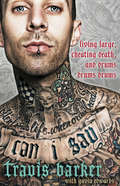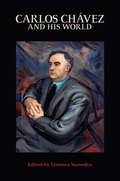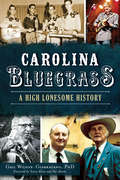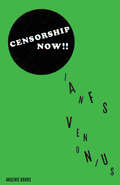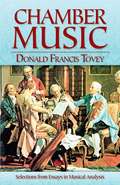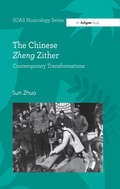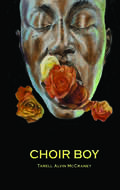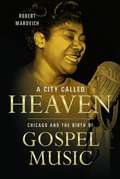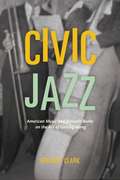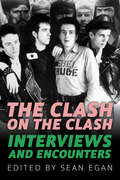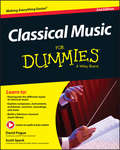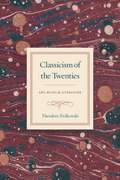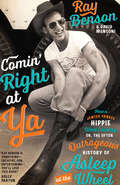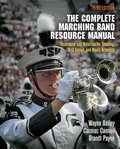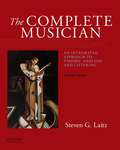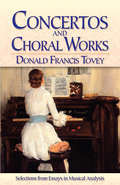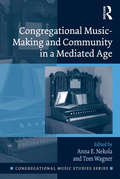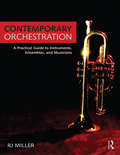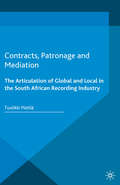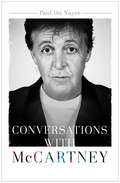- Table View
- List View
Cambridge Cultural Social Studies: Performing Civility
by Lisa MccormickAlthough competitions in classical music have a long history, the number of contests has risen dramatically since the Second World War, all of them aiming to launch young artists' careers. This is not the symptom of marketization that it might appear to be. Despite the establishment of an international governing body, competitions are plagued by rumors of corruption, and even the most mathematically sophisticated voting system cannot quell accusations that the best talent is overlooked. Why do musicians take part? Why do audiences care so much about who wins? Performing Civility is the first book to address these questions. In this groundbreaking study, Lisa McCormick draws from firsthand observations of contests in Europe and the US, in-depth interviews with competitors, jurors and directors, as well as blog data from competition observers to argue that competitions have endured because they are not only about music, they are also about civility.
Cambridge Studies in Linguistics: The Phonology of Consonants
by Wm. G. BennettThe most comprehensive work on dissimilation (the avoidance or repair of combinations of similar sounds) to date, this book proposes a novel analysis that handles dissimilation as the avoidance of surface correspondence relationships. It draws on recent work in Agreement By Correspondence to show that dissimilation is a natural outcome predicted by the same theory of Surface Correspondence. The theory is developed in more detail than ever before, and its predictions are tested and evaluated through ten in-depth analyses of diverse languages from Quechua to Kinyarwanda, together with a typological survey of over 150 dissimilation patterns drawn from over 130 languages, from Acehnese to Zulu. The book redefines the core of Surface Correspondence theory to a level of formal specificity and theoretical precision surpassing previous work. The book's findings are made more accessible by numerous examples featuring data from 47 languages from around the world.
Cambridge Studies in Opera: Foreign Opera at the London Playhouses
by Christina FuhrmannIn the early nineteenth century over forty operas by foreign composers, including Mozart, Rossini, Weber and Bellini, were adapted for London playhouses, often appearing in drastically altered form. Such changes have been denigrated as 'mutilations'. The operas were translated into English, fitted with spoken dialogue, divested of much of their music, augmented with interpolations and frequently set to altered libretti. By the end of the period, the radical changes of earlier adaptations gave way to more faithful versions. In the first comprehensive study of these adaptations, Christina Fuhrmann shows how integral they are to our understanding of early nineteenth-century opera and the transformation of London's theatrical and musical life. This book reveals how these operas accelerated repertoire shifts in the London theatrical world, fostered significant changes in musical taste, revealed the ambiguities and inadequacies of copyright law and sparked intense debate about fidelity to the original work.
Can I Say: Living Large, Cheating Death, and Drums, Drums, Drums
by Gavin Edwards Travis BarkerTravis Barker's soul-baring memoir chronicles the highlights and lowlights of the renowned drummer's art and his life, including the harrowing plane crash that nearly killed him and his traumatic road to recovery--a fascinating never-before-told-in-full story of personal reinvention grounded in musical salvation and fatherhood.<P><P>After breaking out as the acclaimed drummer of the multiplatinum punk band Blink-182, everything changed for Travis Barker. But the dark side of rock stardom took its toll: his marriage, chronicled for an MTV reality show, fell apart. Constant touring concealed a serious drug addiction. A reckoning did not truly come until he was forced to face mortality: His life nearly ended in a horrifying plane crash, and then his close friend, collaborator, and fellow crash survivor DJ AM died of an overdose.In this blunt, driving memoir, Barker ruminates on rock stardom, fatherhood, death, loss, and redemption, sharing stories shaped by decades' worth of hard-earned insights. His pulsating memoir is as energetic as his acclaimed beats. It brings to a close the first chapters of a well-lived life, inspiring readers to follow the rhythms of their own hearts and find meaning in their lives.
Carlos Chavez and His World
by Leonora SaavedraCarlos Chávez (1899-1978) is the central figure in Mexican music of the twentieth century and among the most eminent of all Latin American modernist composers. An enfant terrible in his own country, Chávez was an integral part of the emerging music scene in the United States in the 1920s. His highly individual style--diatonic, dissonant, contrapuntal--addressed both modernity and Mexico's indigenous past. Chávez was also a governmental arts administrator, founder of major Mexican cultural institutions, and conductor and founder of the Orquesta Sinfónica de México. Carlos Chávez and His World brings together an international roster of leading scholars to delve into not only Chávez's music but also the history, art, and politics surrounding his life and work.Contributors explore Chávez's vast body of compositions, including his piano music, symphonies, violin concerto, late compositions, and Indianist music. They look at his connections with such artistic greats as Aaron Copland, Miguel Covarrubias, Henry Cowell, Silvestre Revueltas, and Paul Strand. The essays examine New York's modernist scene, Mexican symphonic music, portraits of Chávez by major Mexican artists of the period, including Diego Rivera and Rufino Tamayo, and Chávez's impact on El Colegio Nacional. A quantum leap in understanding Carlos Chávez and his milieu, this collection will stimulate further work in Latin American music and culture.The contributors are Ana R. Alonso-Minutti, Amy Bauer, Leon Botstein, David Brodbeck, Helen Delpar, Christina Taylor Gibson, Susana González Aktories, Anna Indych-López, Roberto Kolb-Neuhaus, James Krippner, Rebecca Levi, Ricardo Miranda, Julián Orbón, Howard Pollack, Leonora Saavedra, Antonio Saborit, Stephanie Stallings, and Luisa Vilar Payá.Bard Music Festival 2015:Carlos Chávez and His WorldBard CollegeAugust 7-9 and August 14-16, 2015
Carolina Bluegrass: A High Lonesome History
by Gail Wilson-Giarratano Larry Klein Pat AhrensIn the Carolinas, bluegrass is more than music--it's a way of life. The origins of the genre date back to the earliest frontier settlements, and banjo music appeared at dances in Greenville, South Carolina, as early as 1780. The genre was essential to socialization in the textile mills of both states. Old-time music of the Blue Ridge Mountains heavily influenced the sound. Bill Monroe, considered by many to be the father of bluegrass, began his recording career in Charlotte in 1936. Many of the most popular bands, such as the Hired Hands and Briarhoppers, regularly performed live on local television stations in Columbia, Spartanburg and Charlotte. Today, bluegrass festivals fill local calendars across the region. Author Gail Wilson-Giarratano uses interviews and the historic record to tell this unique and compelling story.
Censorship Now!!
by Ian F. Svenonius"While putting a copy of this book on your nightstand would be a sign of good taste, who cares about good taste? Are you willing to be seen reading a book titled Censorship Now!! in public? If so, your skin might burn with funny glances from squares, scolds and looky-loos. But on the inside, you'll feel your brain throbbing as it swells to accommodate some hilarious, absurd and radical new strategies on how to live in our ridiculous world."--Washington Post"Svenonius' new book is Censorship Now!!, and the title alone shows just how provocative the author can be. A collection of essays previously published by Vice, Jacobin, and others, it sets up numerous enemies--both real and straw--for Svenonius to knock down....It's all couched in a style that's part anarchist tirade, part postmodern critique, and part punk-rock snottiness--yet it's addictively ridiculous."--NPR"Censor it all. Film, TV, music, politics, books, news, art--censor all of it. That's the guiding principle of local radical punk Ian Svenonius' latest essay collection, Censorship Now!!"--Washington City Paper, Critics' PickNamed a Favorite Book of 2015 by Jason Diamond at Vol. 1 Brooklyn"Gonzo ecstasy for those who have come to know Svenonius's self-aware political meditations....And though the essays Svenonius writes are not themselves unclear, the process of talking about what he's written involves discussions that some might find uncomfortable. His books make more sense the more you dissect them. So keep them in your back pocket and read them, one word at a time."--Los Angeles Review of Books"A new collection of essays by everyone's favorite supercilious rock theorist...Svenonius has always been the smartest kid in the room....In print, Svenonius is like that curmudgeonly pal that you adore because, even while his insight quivers between humor, paranoia, and antisocial ire, he never dispels your fascination in how he gets there."--SF Weekly"Ian Svenonius is best known as the frontman of bands like the Make-Up and Nation of Ulysses, but he's also a brilliant cultural critic with a talent for coming up with the hottest takes you'll ever read. In this collection, Svenonius makes compelling arguments in favor of censorship and hoarding books and records, amid polemics against Apple and Ikea, the yuppification of indie rock, and the shaving of pubic hair."--Buzzfeed"The essays in Censorship Now!! are equally packed with modest proposals and mock-revolutionary rhetoric, but there are grains of truth in pieces like 'The Historic Role Of Sugar In Empire Building' and 'Heathers Revisited: The Nerd's Fight For Niceness'--they're just buried somewhere between tongue and cheek."--The A.V. Club"Censorship Now!! simultaneously deals in the heated rhetoric of insurgent calls to action, the seductive broad strokes of propaganda, and the clever winking of surrealist humor. Often when I'm really convinced Svenonius has gone off a paranoid deep end, the next sentence hits back with knowingly-hilarious exaggeration or profoundly spot-on analysis, realigning my perspective and making me wonder again....It's fitting that a book whose intentions are ambiguous begins with a call to censor art and ends by letting art do the talking."--PitchforkIan F. Svenonius's new collection of sixteen essays and stories, entitled Censorship Now!!, is reorganizing people's ideas about censorship, Ikea, documentary filmmaking, the Berlin Wall, the film Heathers, the twist, the frug, the mashed potato, shaving one's body, Apple, Inc., Nordic functionalism, the supposed benevolence of the Wikipedia, hoarding, college rock, the origins of the Internet, and more. It's an underground smash which has been met with a horrified gasp in all respectable quarters and gog-eyed enthusiasm in artist garrets the world over.
Chamber Music: Selections from Essays in Musical Analysis (Dover Books On Music: Analysis Ser.)
by Donald Francis ToveyThis volume features selections from the famous musicologist's acclaimed Essays in Musical Analysis. The contents comprise some of Donald F. Tovey's most important essays, including those on Bach's "Goldberg" Variations and The Art of Fugue as well as considerations of key works by Haydn, Mozart, Beethoven, Schumann, Chopin, and Brahms. Tovey's Essays in Musical Analysis rank among the English language's most acclaimed works of musical criticism. Praised for their acuteness, common sense, clarity, and wit, they offer entertaining and instructive reading for anyone interested in the classical music repertoire.
The Chinese Zheng Zither: Contemporary Transformations (SOAS Musicology Series)
by Sun ZhuoThe zheng zither is one of the most popular instruments in contemporary China. It is commonly regarded as a solo instrument with a continuous tradition dating back to ancient times. But in fact, much of its contemporary solo repertory is derived from several different regional folk ensemble repertories of the mid-twentieth century. Since the setting up of China’s modern conservatories, the zheng has been transformed within these new contexts of professional music-making. Over the course of the twentieth century, these regional folk repertories were brought into the performance traditions of modern regional zheng schools. From this basis, a large new zheng repertory was created by conservatory musicians, combining aspects of Western classical music with folk music materials. With the ’opening up’ of China’s economy since the 1980s, the zheng has been brought into the wider stage of international music-making which includes contemporary art music compositions by overseas based Chinese composers and commercial world music works by Western composers. Through a series of case studies, this book explores how the transformation of the Chinese zheng has constantly responded to its changing social context, critiquing the long-standing arguments concerning ’authenticity’ in the development of tradition. This work arises out of, and reflects on, the research methodologies known as performance as research. As an insider to the tradition, brought up within China’s zheng society, a trained and practising zheng performer, this study is largely drawn from the author's own experiences of practising and performing the music in question; her study also draws on fieldwork, as well as primary and secondary written sources in Chinese and English. This book is accompanied by a DVD which contains audio visual materials relating to the author's fieldwork and zheng performances by different zheng musicians.
Choir Boy
by Tarell Alvin Mccraney"An exhilarating, multi-layered new play."-The Guardian"Stirring and stylishly told . . . McCraney's crispest and most confident work."-Daily News"Greatly affecting. . . . It takes a brave writer to set his language against the plaintive beauty of the hymns and spirituals . . . but McCraney's speech holds its own, locating poetry even in casual vernacular and again demonstrating his gift for simile and metaphor."-The Village VoiceThe Charles R. Drew Prep School for Boys is dedicated to the creation of strong, ethical black men. Pharus wants nothing more than to take his rightful place as leader of the school's legendary gospel choir, but can he find his way inside the hallowed halls of this institution if he sings in his own key? Known for his unique brand of urban lyricism, Tarrell Alvin McCraney follows up his acclaimed trilogy The Brother/Sister Plays with this affecting portrait of a gay youth trying to find the courage to let the truth about himself be known. Set against the sorrowful sounds of hymns and spirituals, Choir Boy premiered at the Royal Court in London before receiving its Off-Broadway premiere in summer 2013 to critical and popular acclaim.Tarell Alvin McCraney is author of The Brother/Sister Plays: The Brothers Size, In the Red and Brown Water, and Marcus; Or the Secret of Sweet. Other works include Wig Out!, set in New York's drag clubs, and The Breach, which deals with the aftermath of Hurricane Katrina. His awards include the 2009 Steinberg Playwrights Award and the Paula Vogel Playwriting Award.
Choir Boy
by Tarell Alvin Mccraney"An exhilarating, multi-layered new play."-The Guardian"Stirring and stylishly told . . . McCraney's crispest and most confident work."-Daily News"Greatly affecting. . . . It takes a brave writer to set his language against the plaintive beauty of the hymns and spirituals . . . but McCraney's speech holds its own, locating poetry even in casual vernacular and again demonstrating his gift for simile and metaphor."-The Village VoiceThe Charles R. Drew Prep School for Boys is dedicated to the creation of strong, ethical black men. Pharus wants nothing more than to take his rightful place as leader of the school's legendary gospel choir, but can he find his way inside the hallowed halls of this institution if he sings in his own key? Known for his unique brand of urban lyricism, Tarrell Alvin McCraney follows up his acclaimed trilogy The Brother/Sister Plays with this affecting portrait of a gay youth trying to find the courage to let the truth about himself be known. Set against the sorrowful sounds of hymns and spirituals, Choir Boy premiered at the Royal Court in London before receiving its Off-Broadway premiere in summer 2013 to critical and popular acclaim.Tarell Alvin McCraney is author of The Brother/Sister Plays: The Brothers Size, In the Red and Brown Water, and Marcus; Or the Secret of Sweet. Other works include Wig Out!, set in New York's drag clubs, and The Breach, which deals with the aftermath of Hurricane Katrina. His awards include the 2009 Steinberg Playwrights Award and the Paula Vogel Playwriting Award.
A City Called Heaven: Chicago and the Birth of Gospel Music
by Robert M. MarovichIn A City Called Heaven, gospel announcer and music historian Robert Marovich shines a light on the humble origins of a majestic genre and its indispensable bond to the city where it found its voice: Chicago. Marovich follows gospel music from early hymns and camp meetings through the Great Migration that brought it to Chicago. In time, the music grew into the sanctified soundtrack of the city's mainline black Protestant churches. In addition to drawing on print media and ephemera, Marovich mines hours of interviews with nearly fifty artists, ministers, and historians--as well as discussions with relatives and friends of past gospel pioneers--to recover many forgotten singers, musicians, songwriters, and industry leaders. He also examines how a lack of economic opportunity bred an entrepreneurial spirit that fueled gospel music's rise to popularity and opened a gate to social mobility for a number of its practitioners. As Marovich shows, gospel music expressed a yearning for freedom from earthly pains, racial prejudice, and life's hardships. In the end, it proved to be a sound too mighty and too joyous for even church walls to hold.
Civic Jazz: American Music and Kenneth Burke on the Art of Getting Along
by Gregory ClarkJazz is born of collaboration, improvisation, and listening. In much the same way, the American democratic experience is rooted in the interaction of individuals. It is these two seemingly disparate, but ultimately thoroughly American, conceits that Gregory Clark examines in Civic Jazz. Melding Kenneth Burke’s concept of rhetorical communication and jazz music’s aesthetic encounters with a rigorous sort of democracy, this book weaves an innovative argument about how individuals can preserve and improve civic life in a democratic culture. Jazz music, Clark argues, demonstrates how this aesthetic rhetoric of identification can bind people together through their shared experience in a common project. While such shared experience does not demand agreement--indeed, it often has an air of competition--it does align people in practical effort and purpose. Similarly, Clark shows, Burke considered Americans inhabitants of a persistently rhetorical situation, in which each must choose constantly to identify with some and separate from others. Thought-provoking and path-breaking, Clark’s harmonic mashup of music and rhetoric will appeal to scholars across disciplines as diverse as political science, performance studies, musicology, and literary criticism.
The Clash on Clash: Interviews and Encounters
by Sean EganThe Clash thought they could change the world. They never did, but they created some of the greatest rock music of all time in the attempt.Clash interviews were mesmerizing. Infused with the messianic spirit of punk, the Clash engaged with the press like no rock group before or since, treating interviews almost as addresses to the nation. Their pronouncements were welcomed but were hardly uncritically reported. The Clash's back pages are voluminous, crackle with controversy, and constitute a snapshot of a uniquely thoughtful and fractious period in modern history. Included in this compendium are the Clash's encounters with the most brilliant music writers of their time, including Lester Bangs, Nick Kent, Mikal Gilmore, Chris Salewicz, Charles Shaar Murray, Mick Farren, Kris Needs, and Lenny Kaye.Whether it be their audience with the (mainly) simpatico likes of punk fanzine Sniffin' Glue, their testy encounters with the correspondents of pious UK weeklies like New Musical Express, Melody Maker, and Sounds, or their friendlier but no less eyebrow-raising conversations with US periodicals like Creem and Rolling Stone, the Clash consistently created copy that lived up to their sobriquet "The Only Band That Matters."
Classical Music For Dummies
by Scott Speck David PogueHaydn, Tchaikovsky, and Brahms, oh, my! The beginner's guide to classical music Classical Music For Dummies is a friendly, funny, easy-to-understand guide to composers, instruments, orchestras, concerts, recordings, and more. Classical music is widely considered one of the pinnacles of human achievement, and this informative guide will shows you just how beautiful and rewarding it can be. You'll learn how Bach is different from Beethoven, how Mozart is different still, and why not all "classical" music is actually Classical if it's really Baroque or Romantic. You'll be introduced to the composers and their work, and discover the groundbreaking pieces that shake the world every time they're played. Begin building your classical music library with the essential recordings that define orchestral, choral, and operatic beauty as you get acquainted with the orchestras and musicians that bring the composers to life. Whether you want to play classical music or just learn more about it, Classical Music For Dummies will teach you everything you need to know to get the most out of this increasingly popular genre. Distinguish flute from piccolo, violin from viola, and trumpet from trombone Learn the difference between overtures, requiems, arias, and masses Explore the composers that shaped music as we know it Discover the recordings your music library cannot be without Classical music has begun sneaking into the mainstream -- if your interest has been piqued, there's never been a better time to develop an appreciation for this incredibly rich, complex, and varied body of work. Classical Music For Dummies lays the groundwork, and demonstrates just how amazing classical music can be.
Classicism of the Twenties: Art, Music, and Literature
by Theodore ZiolkowskiThe triumph of avant-gardes in the 1920s tends to dominate our discussions of the music, art, and literature of the period. But the broader current of modernism encompassed many movements, and one of the most distinct and influential was a turn to classicism. In Classicism of the Twenties, Theodore Ziolkowski offers a compelling account of that movement. Giving equal attention to music, art, and literature, and focusing in particular on the works of Stravinsky, Picasso, and T. S. Eliot, he shows how the turn to classicism manifested itself. In reaction both to the excesses of neoromanticism and early modernism and to the horrors of World War I--and with respectful detachment--artists, writers, and composers adapted themes and forms from the past and tried to imbue their own works with the values of simplicity and order that epitomized earlier classicisms. By identifying elements common to all three arts, and carefully situating classicism within the broader sweep of modernist movements, Ziolkowski presents a refreshingly original view of the cultural life of the 1920s.
Comin' Right at Ya: How a Jewish Yankee Hippie Went Country, or, the Often Outrageous History of Asleep at the Wheel (Brad and Michele Moore Roots Music Series) (Brad and Michele Moore Roots Music Series)
by Ray Benson David Menconi&“Full of humor and humility . . . Since Benson started Asleep at the Wheel as a working-class country band, it&’s one helluva ride worth telling.&” —The Austin Chronicle A six-foot-seven-inch Jewish hippie from Philadelphia starts a Western swing band in 1970. It sounds like a joke but—more than forty years, twenty-five albums, and nine Grammy Awards later—Asleep at the Wheel is still drawing crowds around the world. The roster of musicians who&’ve shared a stage with the Wheel is a who&’s who of American popular music—Van Morrison, Willie Nelson, Dolly Parton, Emmylou Harris, George Strait, Vince Gill, Lyle Lovett, and so many more. And the bandleader who&’s brought them all together is the hippie that claimed Bob Wills&’s boots: Ray Benson. In this hugely entertaining memoir, Benson looks back over his life and wild ride with Asleep at the Wheel from the band&’s beginning in Paw Paw, West Virginia, through its many years as a Texas institution. He vividly recalls all the inevitable ups and downs and changes in personnel and describes the making of classic albums such as Willie and the Wheel and Tribute to the Music of Bob Willsand the Texas Playboys. The ultimate music industry insider, Benson explains better than anyone else how the Wheel got rock hipsters and die-hard country fans to love groovy new-old Western swing. Decades later, they still do. &“Ray Benson is something—creative, fun, entertaining—you&’ll love this book!&” —Dolly Parton &“I&’ve known Ray Benson for over forty years and never could figure out how he does all he does while asleep at the wheel! This book, however, tells how it all went down!&” —Willie Nelson
Comin' Right at Ya: How a Jewish Yankee Hippie Went Country, or, the Often Outrageous History of Asleep at the Wheel (Brad and Michele Moore Roots Music Series) (Brad and Michele Moore Roots Music Series)
by David Menconi Ray Benson&“Full of humor and humility . . . Since Benson started Asleep at the Wheel as a working-class country band, it&’s one helluva ride worth telling.&” —The Austin Chronicle A six-foot-seven-inch Jewish hippie from Philadelphia starts a Western swing band in 1970. It sounds like a joke but—more than forty years, twenty-five albums, and nine Grammy Awards later—Asleep at the Wheel is still drawing crowds around the world. The roster of musicians who&’ve shared a stage with the Wheel is a who&’s who of American popular music—Van Morrison, Willie Nelson, Dolly Parton, Emmylou Harris, George Strait, Vince Gill, Lyle Lovett, and so many more. And the bandleader who&’s brought them all together is the hippie that claimed Bob Wills&’s boots: Ray Benson. In this hugely entertaining memoir, Benson looks back over his life and wild ride with Asleep at the Wheel from the band&’s beginning in Paw Paw, West Virginia, through its many years as a Texas institution. He vividly recalls all the inevitable ups and downs and changes in personnel and describes the making of classic albums such as Willie and the Wheel and Tribute to the Music of Bob Willsand the Texas Playboys. The ultimate music industry insider, Benson explains better than anyone else how the Wheel got rock hipsters and die-hard country fans to love groovy new-old Western swing. Decades later, they still do. &“Ray Benson is something—creative, fun, entertaining—you&’ll love this book!&” —Dolly Parton &“I&’ve known Ray Benson for over forty years and never could figure out how he does all he does while asleep at the wheel! This book, however, tells how it all went down!&” —Willie Nelson
The Complete Marching Band Resource Manual: Techniques and Materials for Teaching, Drill Design, and Music Arranging
by Wayne Bailey Cormac Cannon Brandt PayneThe Complete Marching Band Resource Manual is the definitive guide to the intricate art of directing college and high school marching bands. Supplemented with musical arrangements, warm-up exercises, and over a hundred drill charts, this manual presents both the fundamentals and the advanced techniques that are essential for successful marching band leadership. The materials in this volume cover every stage of musical direction and instruction, from selecting music and choreographing movements to improving student memorization and endurance to the creation of striking visual configurations through uniform and auxiliary units.Now in its third edition, The Complete Marching Band Resource Manual has been thoroughly updated to reflect new standards for drill design, charting, and musical arrangement. Offering a fresh approach to the essentials of good marching band design, this comprehensive resource shows both veteran and novice band directors how to prepare students to perform seamless and sophisticated musical formations.
The Complete Musician: An Integrated Approach To Theory, Analysis And Listening
by Steven G. Laitz Ian SewellBeginning with music fundamentals, The Complete Musician covers all the topics necessary for a thorough understanding of undergraduate music theory by focusing on music in context. <P><P>Rather than rote learning of concepts and memorizing terms, The Complete Musician emphasizes how theory informs the work of performers. Composers respond not only to their instincts, experiences, and training in every work they write; they also follow certain ideals and models when appropriate, and modify them to fit their own personal vision. <P><P>Theory is not a "theoretical" activity; it is a living one that responds to how music is composed and performed. Understanding how theory intersects with composition and performance is key to seeing its relevance to students' wider musical lives. The Complete Musician makes this connection.
Concertos and Choral Works: Selections from Essays in Musical Analysis
by Donald Francis ToveyDrawn from the well-known musicologist's celebrated Essays in Musical Analysis, this volume contains nearly all of the concertos in the standard repertoire, from Bach's concerto for two violins to Walton's concerto for viola. More than fifty selections include choral works with in-depth essays on Bach's Mass in B minor, Beethoven's Mass in D, Brahms's and Verdi's Requiems, Haydn's The Creation and The Seasons, and many other landmark works. Donald Francis Tovey's Essays in Musical Analysis ranks among the English language's most acclaimed works of musical criticism. Praised for their acuteness, common sense, clarity, and wit, they offer entertaining and instructive reading for anyone interested in the classical music repertoire.
Congregational Music-Making and Community in a Mediated Age: Singing A New Song (Congregational Music Studies Series)
by Anna E. Nekola Tom WagnerCongregational music can be an act of praise, a vehicle for theology, an action of embodied community, as well as a means to a divine encounter. This multidisciplinary anthology approaches congregational music as media in the widest sense - as a multivalent communication action with technological, commercial, political, ideological and theological implications, where processes of mediated communication produce shared worlds and beliefs. Bringing together a range of voices, promoting dialogue across a range of disciplines, each author approaches the topic of congregational music from his or her own perspective, facilitating cross-disciplinary connections while also showcasing a diversity of outlooks on the roles that music and media play in Christian experience. The authors break important new ground in understanding the ways that music, media and religious belief and praxis become ’lived theology’ in our media age, revealing the rich and diverse ways that people are living, experiencing and negotiating faith and community through music.
Contemporary Orchestration: A Practical Guide to Instruments, Ensembles, and Musicians
by R.J. MillerContemporary Orchestration: A Practical Guide to Instruments, Ensembles, and Musicians teaches students how to orchestrate for a wide variety of instruments, ensembles, and genres, while preparing them for various real-world professional settings ranging from the concert hall to the recording studio. Unlike most orchestration texts, it includes coverage of contemporary instruments and ensembles alongside traditional orchestra and chamber ensembles. Features Practical considerations: Practical suggestions for choosing a work to orchestrate, and what to avoid when writing for each instrument. Pedagogical features In the Profession: Professional courtesies, considerations and expectations. Building the Score: Step-by-step construction of an orchestration. Scoring Examples: Multiple scoring examples for each instrument. Exercises: Analyzing, problem solving, and creating orchestration solutions. Critical Thinking: Alternate approaches and solutions.
Contracts, Patronage and Mediation: The Articulation of Global and Local in the South African Recording Industry (Pop Music, Culture and Identity)
by Tuulikki PietiläThis book studies the long-term developments in the South African recording industry and adds to the existing literature an understanding of the prevalence of informal negotiations over rights, rewards and power in the recording industry. It argues that patronage features often infiltrate the contractual relationships in the industry.
Conversations with McCartney
by Paul Du NoyerIn June 1989, Paul Du Noyer was contacted by Paul McCartney's office in London and asked to interview the star as they had met once before and enjoyed a good raport. In the years that followed, Paul Du Noyer continued to meet, interview and work for Paul McCartney on a regular basis, producing magazine articles, tour programmes, album liner notes, press materials and website editorial. It's likely that Du Noyer has spent more hours in formal, recorded conversation with McCartney than any other writer. Conversations with McCartney is the culmination of Du Noyer's long association with McCartney and his music. It draws from their interview sessions across 35 years, coupling McCartney's own, candid thoughts with his observations and analysis.

